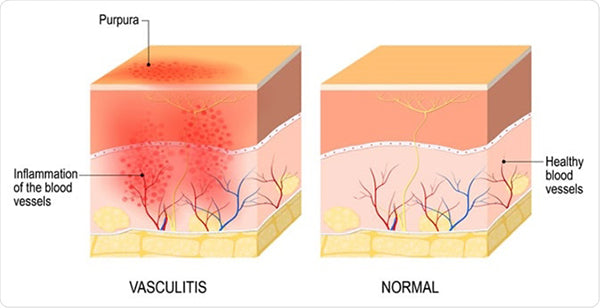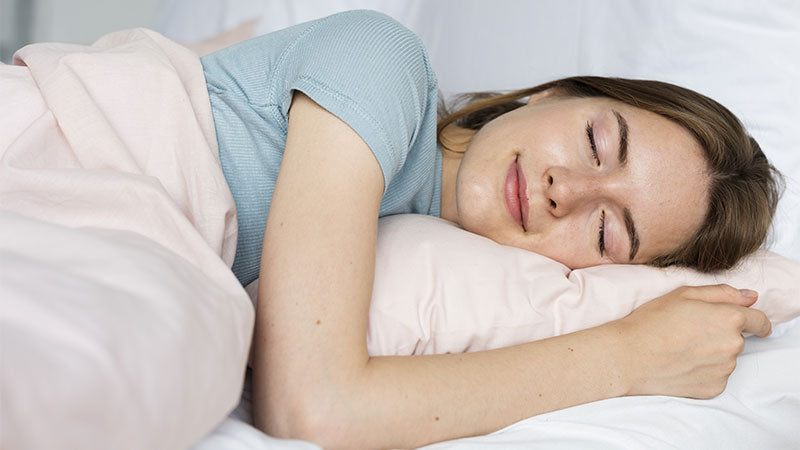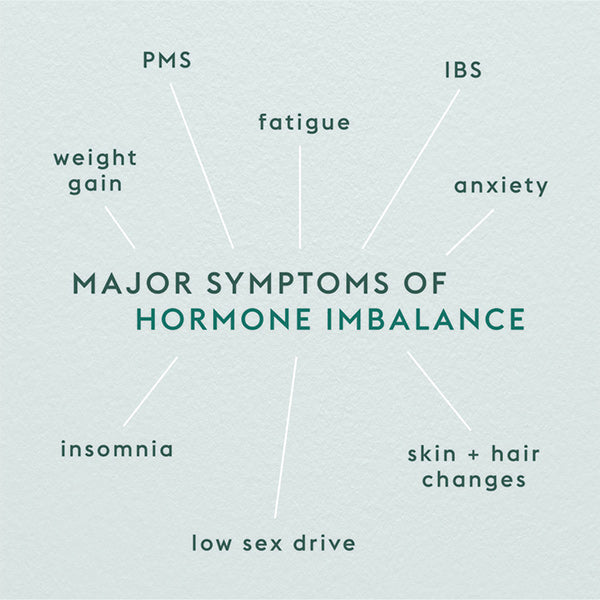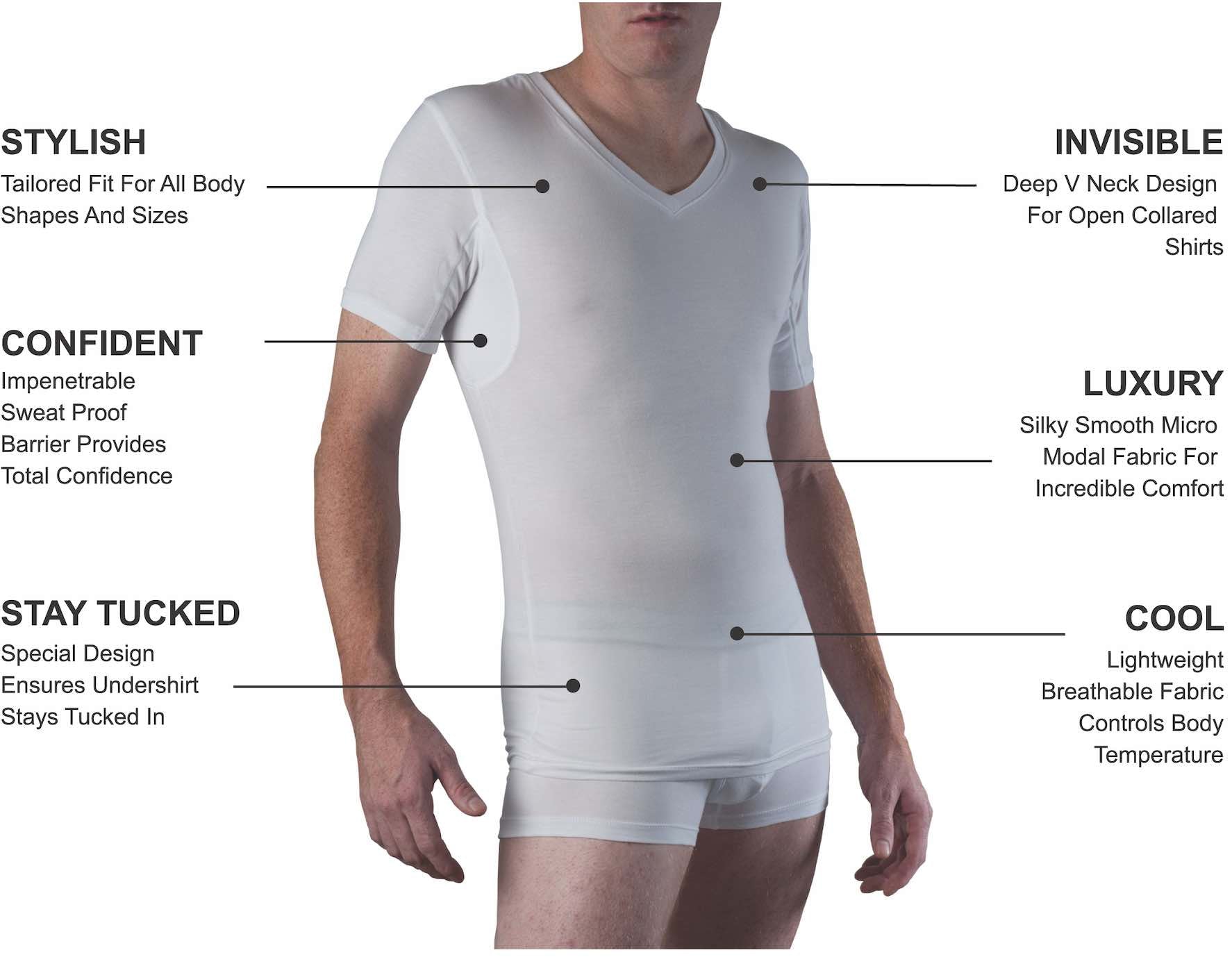Have you ever woken up in the middle of the night only to find yourself, your clothing and your bedding drenched in sweat?
And, has this happened even on a cool night or when you went to bed lightly dressed?
If you've experienced this, you may be suffering from sleep hyperhidrosis.
But here’s some good news! There are ways to treat and manage the condition. The solution can be as simple as wearing sweatproof clothing; so don't despair.
This condition is more commonly referred to as night sweats.
When you experience night sweats, factors such as room temperature may not be the only cause of heavy sweating.
Instead, this condition may come about as a result of underlying health issues.
Preventing night sweats calls for identification of the causal factors. This is because treatment depends on the person's specific medical issue.
Experiencing sleep hyperhidrosis can make you wonder why you sweat more than other people.
However, hyperhidrosis is fairly common.
Research indicates that it affects roughly 3-5% of the American population (about 10 million people).
This number could be higher, as some remain unaware that they're dealing with a medical condition. As such, they've never received an official hyperhidrosis diagnosis.
Before examining the causes of night sweats, let's rule out factors that cause general sweating at night unrelated to sleep hyperhidrosis.
Warm Sleepwear or Bedding
This may seem a little obvious, which is why it's easy to overlook.
Wearing warm clothes such as flannel pajamas, especially during warmer times of the year, could explain your sweating.
In the same vein, dressing in layers and sleeping under heavy bedding are possible sweat triggers.
The reason for this? Thermoregulation.
This is a mechanism your body has in place to help maintain consistent body temperature, as fluctuations can cause organ damage.
As a result of thermoregulation, your body cools down while you sleep at night. This happens because you're less active and require less energy. Consequently, the process enables you to sleep.
Warm clothes and heavy bedding trap your body heat, making the process less effective. This eventually causes you to sweat.
Overly Warm Bedroom Temperature
Okay, so you've ditched the extra warm bedding and clothing.
Next potential culprit? The temperature in your room.
You may not find your room too warm if your skin has become accustomed to the temperature you set your thermostat to.
As you try to get some shut-eye, your body is likely struggling to keep you cool enough.
What's the way forward, then?
It is advisable that you set your thermostat to a range within the mid-60s degrees Fahrenheit.
So, keep it cool. Really.
Illness
Lastly, you may experience sweating at night even though you don't have sleep hyperhidrosis when your system is out of order.
Coming down with the occasional cold gets your immune system all fired up to restore your health.
Once this happens, it's very likely to result in a heightened core body temperature.
As such, when you're unwell it's not out of the ordinary to sweat more than usual at night.
You should start to sweat less at night as soon as you make a full recovery from your illness.
What Causes Night Sweats?
If your night sweats persist despite trying these measures, you can then attribute your condition to a medical issue.
As mentioned above, certain medical conditions can cause night sweats. Let's examine these factors one by one in more detail.
1. Anxiety Disorders
Having an anxiety disorder means living with a very active nervous system.
Anxiety isn’t relegated to being only emotional or mental in nature. Rather, it manifests physically as well.
Research findings presented in 2019 to the American Academy of Dermatology by Anna Glaser, MD offer an explanation.
Dr. Glaser established that many of her hyperhidrosis patients also had anxiety.
This led her to conduct a study that found people with hyperhidrosis are more likely to have anxiety as well as other mental health conditions.
Night sweats, as well as hot flashes, are a common physical symptom of anxiety.
The vagus nerve controls several body processes, including temperature. This is easily affected by your mental state.
Given how easily moods can fluctuate, it's good to take charge by monitoring how you feel at any given time. Click here for a free, quick and easy mood self-assessment.
If you frequently struggle with anxious thoughts, don't suffer in silence. There are ways to manage anxiety disorders, and you can find out more here.
Managing anxiety can help reduce sweat production.
2. Certain Cancers
"Night sweats associated with cancer tend to be drenching and often are accompanied by other symptoms such as fever and unexplained weight loss." — Dana-Farber Cancer Institute
Night sweats can sometimes be associated with cancer.
Some cancers are known to cause heavy perspiration at night as well as hot flashes, including leukemia, lymphoma, and thyroid cancer.
Furthermore, sleep hyperhidrosis is a common side effect of cancer treatment.
Patients undergoing the following procedures are likely to experience persistent night sweats:
- Surgery
- Radiation therapy
- Chemotherapy
- Hormone therapy (such as antiestrogens)
There are two main ways through which night sweats can become more manageable.
The first entails non-drug interventions. According to the National Cancer Institute, comfort measures can help.
One such measure is sleeping in a sweatproof undershirt.
The other way to minimize night sweats for cancer patients is through hormone replacement therapy.
This is a form of treatment that supplements hormones when the body fails to produce enough on its own.
3. Gastroesophageal Reflux Disease
Many people often experience an uncomfortable burning sensation after meals (heartburn).
This is a result of gastroesophageal reflux.
Over time, this can develop into a disease called gastroesophageal reflux disease (GERD).
When you have GERD, acidic contents from your stomach travel up to your esophagus.
This condition is commonly referred to as acid reflux.
This regurgitation can inflame and damage the esophagus lining (esophagitis).
The stomach produces acid and pepsin during digestion, which causes heartburn.
In addition to heartburn, you're likely to experience night sweats if you have GERD.
Effectively managing the condition can help reduce the severity of these night sweats.
You should sleep at an inclined position (e.g., by tilting your pillow) as opposed to lying completely flat.
And to prevent night sweats from disrupting your sleep, wear light and comfortable clothes to bed.
4. Hormone Imbalance
Hormones are the chemicals produced by glands in the endocrine system. Once secreted, hormones travel through the bloodstream to body tissues and organs.
They issue signals indicating what your organs should do and when.
As such, hormones play a key role in regulating major bodily processes such as:
- Appetite
- Metabolism
- Heart rate
- Growth and development
- Body temperature
- Sleep cycles
- Reproductive cycles
- Mood and stress levels
It's therefore understandable that an imbalance of hormones has serious effects on a wide range of bodily functions.
The hypothalamus is the part of the human brain tasked with releasing and inhibiting hormones.
If the hypothalamus is unable to regulate hormones, it may also have trouble regulating your body temperature.
Conditions that can cause hormone imbalance are:
- Carcinoid syndrome
- Hyperthyroidism
- Pheochromocytoma
Hormone imbalance affects both men and women.
In women, it is primarily brought about by pregnancy and menopause.
Hot flashes occur when hormone levels fluctuate, raising adrenaline and body temperature.
Pregnancy also affects hormones and as such, many expectant mothers experience night sweats. This is normal and shouldn't be a cause for concern.
Sleep hyperhidrosis affects approximately 35% of women during pregnancy.
In men, hormone imbalance affects growth hormones and testosterone.
5. Hypoglycemia
It's normal for people with diabetes to experience changes in blood sugar levels at different times of the day.
If these variances happen within a given range, you may not even notice.
When blood sugar levels drop too low, a condition called hypoglycemia occurs.
While signs of low blood sugar vary among patients, the following are common for most, according to the American Diabetes Association:
- Feeling shaky
- Sweating, chills, and clamminess
- Irritability/impatience
- Nervousness and anxiety
- Confusion
- Increased heartbeat rate
- Headaches
- Lightheadedness/dizziness
- Coordination problems
- Hunger
- Nausea
- Weakness
- Blurred vision
As listed above, hypoglycemia can result in sweating.
Taking insulin to treat diabetes can cause drops in blood sugar at night, which then leads to night sweats.
6. Infections
Night sweats could indicate infection. Some serious infections known to cause night sweats include:
- Tuberculosis: this highly contagious infection affects the lungs
- Osteomyelitis: an infection of the bones
- Endocarditis: an infection of the heart's valves
- Human Immunodeficiency Virus (HIV)
- Brucellosis: contracted from animals suffering from it or consumption of their unpasteurized products
7. Medications
When you're taking certain medications, you may experience night sweats as one of the side effects.
Some drugs known to cause night sweats include:
- Antidepressants
- Tricyclic
- Selective serotonin reuptake inhibitor (SSRI)
- Pain relief medications (e.g., aspirin and acetaminophen)
- Phenothiazine antipsychotics
- Steroids such as cortisone and prednisone
- Diabetes medications that help lower blood sugar
- Hormone therapy medication
If the night sweats become unbearable and affect your sleep, inform the healthcare provider who prescribed your medication.
They may be able to substitute the medication with one that doesn't cause you to sweat excessively at night.
8. Sleep Apnea
Sleep apnea is a condition that makes you stop breathing when you're asleep. This usually happens several times in a given night.
This generally occurs when there's a blockage in your airway such as throat tissue.
You may also develop a form of this condition called central sleep apnea.
This occurs when certain health issues affect the functioning of your central nervous system.
It’s not unusual to have night sweats accompanying sleep apnea.
A 2013 study found that people with untreated sleep apnea sweat at night three times as often as those without the condition.
Though the correlation is unclear, increased blood pressure from oxygen deprivation could be the trigger.
In addition to breathing difficulties, if you have sleep apnea, you are likely to:
- Sleep restlessly
- Wake up several times per night
- Wake up with a sore throat
- Feel tired in the daytime
- Have difficulty focusing during the day
- Have headaches
- Exhibit symptoms of anxiety or depression
Sleep apnea may cause serious complications if it goes untreated. For instance, it can increase your risk of getting asthma or even cardiovascular issues.
9. Takayasu’s Arteritis

Image courtesy
Takayasu’s arteritis is a disorder that affects the blood vessels, causing inflammation and damage.
The exact cause of Takayasu’s arteritis largely remains a mystery.
Doctors, however, have established that an infection condition could trigger the condition. It's also likely to be an autoimmune disease.
Night sweats are common among people affected by Takayasu’s arteritis, probably because it affects the immune system.
When the human immune system detects danger, one of the ways it responds is through temperature regulation. This can lead to fever and sweating.
Once your doctor identifies the cause of your night sweats, you will receive the necessary treatment.
Nevertheless, it's important to note that treatment is an ongoing process. For this reason, you may not experience relief from night sweats for a while.
This means that you need to manage the sweating effectively.
Sleeping in a sweatproof undershirt is one way to get relief from sweating at night.
Don't Sweat It. Stay Fresh & Dry With Sweatshield
Sweatshield undershirts are intentionally designed to keep sweat from being a nuisance.
Using a unique Sweat Barrier technology, the undershirts absorb perspiration from the back or the underarms.
The moisture then evaporates so that odor doesn't have a chance to form, and neither do sweat stains.
For a premium, silky smooth feel, Sweatshield uses micromodal fabric to keep you comfortable.
People from all around the world have tried and tested Sweatshield. With hundreds of 5-star reviews, our customers can rest easy from the sweat protection our undershirts provide.
To guarantee your satisfaction, Sweatshield offers refunds or exchanges. Click here to find out more.
Don't let sweat hold you back by disrupting your sleep. Try our undershirts available for both women and men to stay fresh, dry, and comfortable.
Photo: Freepik











